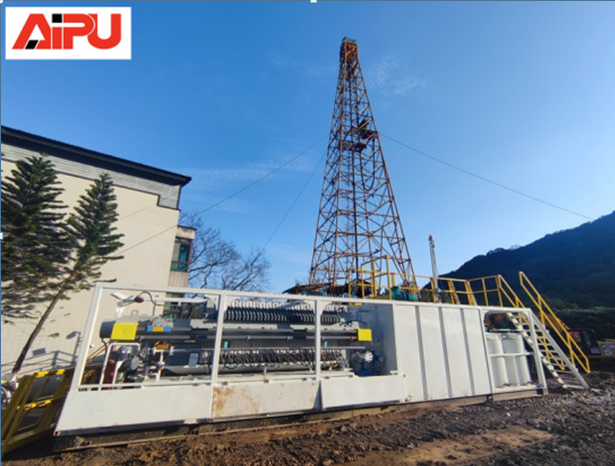Advanced Equipment for Efficient Drilling Operations
In the oil and gas industry, drilling operations are a significant cost - center. Solids control equipment has emerged as a game - changer in transforming drilling economics. This article explores the various ways in which this equipment is making a difference.
Enhanced Drilling Fluid Performance
Drilling fluid, also known as mud, plays a crucial role in drilling operations. Solids control equipment helps maintain the quality of the drilling fluid. By removing unwanted solids such as cuttings, the equipment ensures that the mud retains its desired properties. A well - maintained drilling fluid has better lubrication, which reduces friction between the drill bit and the formation. This results in less wear and tear on the drill bit, extending its lifespan. Moreover, proper fluid performance allows for more efficient hole cleaning, preventing blockages and improving the overall drilling speed. As a result, the cost associated with frequent bit replacements and slow drilling is significantly reduced.
Reduction in Waste Disposal Costs
One of the major expenses in drilling is waste disposal. Solids control equipment separates the solids from the drilling fluid, enabling the reuse of the fluid. This reduces the volume of waste that needs to be disposed of. In addition, the separated solids can sometimes be further processed and recycled, minimizing the environmental impact and the cost of waste management. By reducing the amount of waste sent to landfills or treatment facilities, drilling companies can save a substantial amount of money on disposal fees, which are often based on the volume and type of waste.
Improved Wellbore Stability
Wellbore stability is essential for successful drilling. Solids control equipment helps in maintaining the right balance of solids in the drilling fluid, which is crucial for wellbore integrity. When the drilling fluid contains an appropriate amount of solids, it can form a stable filter cake on the wellbore wall. This filter cake prevents fluid loss into the formation and helps support the wellbore, reducing the risk of wellbore collapse. Avoiding wellbore instability issues means less time and money spent on corrective measures such as casing repairs or wellbore re - drilling, which can be extremely costly and time - consuming.
Increased Operational Efficiency
Solids control equipment streamlines the drilling process, leading to increased operational efficiency. By continuously removing solids from the drilling fluid, the equipment ensures that the drilling system operates smoothly. This reduces downtime due to equipment malfunctions caused by solid - related issues, such as clogged pipes or pumps. Additionally, the improved drilling fluid quality allows for more consistent and reliable drilling operations. With fewer interruptions and a more efficient process, drilling companies can complete projects faster, which translates into significant cost savings and increased profitability.
In conclusion, solids control equipment is an indispensable part of modern drilling operations. Its ability to enhance drilling fluid performance, reduce waste disposal costs, improve wellbore stability, and increase operational efficiency makes it a key factor in transforming drilling economics.

Enhanced Drilling Fluid Performance
Drilling fluid, also known as mud, plays a crucial role in drilling operations. Solids control equipment helps maintain the quality of the drilling fluid. By removing unwanted solids such as cuttings, the equipment ensures that the mud retains its desired properties. A well - maintained drilling fluid has better lubrication, which reduces friction between the drill bit and the formation. This results in less wear and tear on the drill bit, extending its lifespan. Moreover, proper fluid performance allows for more efficient hole cleaning, preventing blockages and improving the overall drilling speed. As a result, the cost associated with frequent bit replacements and slow drilling is significantly reduced.
Reduction in Waste Disposal Costs
One of the major expenses in drilling is waste disposal. Solids control equipment separates the solids from the drilling fluid, enabling the reuse of the fluid. This reduces the volume of waste that needs to be disposed of. In addition, the separated solids can sometimes be further processed and recycled, minimizing the environmental impact and the cost of waste management. By reducing the amount of waste sent to landfills or treatment facilities, drilling companies can save a substantial amount of money on disposal fees, which are often based on the volume and type of waste.
Improved Wellbore Stability
Wellbore stability is essential for successful drilling. Solids control equipment helps in maintaining the right balance of solids in the drilling fluid, which is crucial for wellbore integrity. When the drilling fluid contains an appropriate amount of solids, it can form a stable filter cake on the wellbore wall. This filter cake prevents fluid loss into the formation and helps support the wellbore, reducing the risk of wellbore collapse. Avoiding wellbore instability issues means less time and money spent on corrective measures such as casing repairs or wellbore re - drilling, which can be extremely costly and time - consuming.
Increased Operational Efficiency
Solids control equipment streamlines the drilling process, leading to increased operational efficiency. By continuously removing solids from the drilling fluid, the equipment ensures that the drilling system operates smoothly. This reduces downtime due to equipment malfunctions caused by solid - related issues, such as clogged pipes or pumps. Additionally, the improved drilling fluid quality allows for more consistent and reliable drilling operations. With fewer interruptions and a more efficient process, drilling companies can complete projects faster, which translates into significant cost savings and increased profitability.
In conclusion, solids control equipment is an indispensable part of modern drilling operations. Its ability to enhance drilling fluid performance, reduce waste disposal costs, improve wellbore stability, and increase operational efficiency makes it a key factor in transforming drilling economics.








